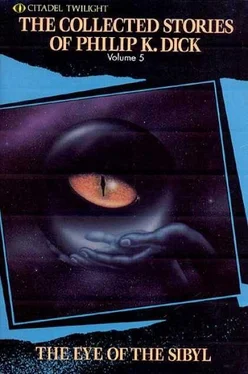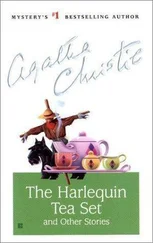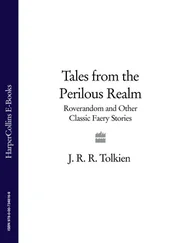Philip Dick - The Complete Stories of Philip K. Dick Vol. 5 - The Eye of the Sibyl and Other Classic Stories
Здесь есть возможность читать онлайн «Philip Dick - The Complete Stories of Philip K. Dick Vol. 5 - The Eye of the Sibyl and Other Classic Stories» весь текст электронной книги совершенно бесплатно (целиком полную версию без сокращений). В некоторых случаях можно слушать аудио, скачать через торрент в формате fb2 и присутствует краткое содержание. Жанр: Фантастика и фэнтези, на английском языке. Описание произведения, (предисловие) а так же отзывы посетителей доступны на портале библиотеки ЛибКат.
- Название:The Complete Stories of Philip K. Dick Vol. 5: The Eye of the Sibyl and Other Classic Stories
- Автор:
- Жанр:
- Год:неизвестен
- ISBN:нет данных
- Рейтинг книги:4 / 5. Голосов: 1
-
Избранное:Добавить в избранное
- Отзывы:
-
Ваша оценка:
- 80
- 1
- 2
- 3
- 4
- 5
The Complete Stories of Philip K. Dick Vol. 5: The Eye of the Sibyl and Other Classic Stories: краткое содержание, описание и аннотация
Предлагаем к чтению аннотацию, описание, краткое содержание или предисловие (зависит от того, что написал сам автор книги «The Complete Stories of Philip K. Dick Vol. 5: The Eye of the Sibyl and Other Classic Stories»). Если вы не нашли необходимую информацию о книге — напишите в комментариях, мы постараемся отыскать её.
The Complete Stories of Philip K. Dick Vol. 5: The Eye of the Sibyl and Other Classic Stories — читать онлайн бесплатно полную книгу (весь текст) целиком
Ниже представлен текст книги, разбитый по страницам. Система сохранения места последней прочитанной страницы, позволяет с удобством читать онлайн бесплатно книгу «The Complete Stories of Philip K. Dick Vol. 5: The Eye of the Sibyl and Other Classic Stories», без необходимости каждый раз заново искать на чём Вы остановились. Поставьте закладку, и сможете в любой момент перейти на страницу, на которой закончили чтение.
Интервал:
Закладка:
HOLY QUARREL 9/13/65. Worlds of Tomorrow, May 1966.
NOT BY ITS COVER 9/21/65. Famous Science Fiction, Summer 1968.
Here I presented what used to be a wish on my part: that the Bible was true. Obviously, I was at a sort of halfway point between doubt and faith. Years later I'm still in that position; I'd like the Bible to be true, but - - well, maybe if it isn't we can make it so. But, alas, it's going to take plenty of work to do it. (1978)
RETURN MATCH 10/14/65. Galaxy, Feb 1967.
The theme of dangerous toys runs like a tattered thread throughout my writing. The dangerous disguised as the innocent… and what could be more innocent than a toy? This story makes me think of a set of huge speakers I looked at last week; they cost six thousand dollars and were larger than refrigerators. Our joke about them was that if you didn't go to the audio store to see them, they'd come to see you. (1978)
FAITH OF OUR FATHERS 1/17/66. Dangerous Visions, edited by Harlan Ellison, Garden City, 1967. [Hugo Award nominee]
The title is that of an old hymn. I think, with this story, I managed to offend everybody, which seemed at the time to be a good idea, but which I've regretted since. Communism, drugs, sex, God - - I put it all together, and it's been my impression since that when the roof fell in on me years later, this story was in some eerie way involved. (1976)
I don't advocate any of the ideas in Faith Of Our Fathers; I don't, for example, claim that the Iron Curtain countries will win the cold war - - or morally ought to. One theme in the story, however, seems compelling to me, in view of recent experiments with hallucinogenic drugs: the theological experience, which so many who have taken LSD have reported. This appears to me to be a true new frontier; to a certain extent the religious experience can now be scientifically studied… and, what is more, may be viewed as part hallucination but containing other, real components. God, as a topic in science fiction, when it appeared at all, used to be treated polemically, as in OUT OF THE SILENT PLANET . But I prefer to treat it as intellectually exciting. What if, through psychedelic drugs, the religious experience becomes commonplace in the life of intellectuals? The old atheism, which seemed to many of us - including me - - valid in terms of our experiences, or rather lack of experiences, would have to step momentarily aside. Science fiction, always probing what is about to be thought, become, must eventually tackle without preconceptions a future neo-mystical society in which theology constitutes as major a force as in the medieval period. This is not necessarily a backward step, because now these beliefs can be tested - forced to put up or shut up. I, myself, have no real beliefs about God; only my experience that He is present… subjectively, of course; but the inner realm is real too. And in a science fiction story one projects what has been a personal inner experience into a milieu; it becomes socially shared, hence discussable. The last word, however, on the subject of God may have already been said: in A.D. 840 by John Scotus Erigena at the court of the Frankish king Charles the Bald. "We do not know what God is. God Himself does not know what He is because He is not anything. Literally God is not, because He transcends being." Such a penetrating - - and Zen - mystical view, arrived at so long ago, will be hard to top; in my own experiences with psychedelic drugs I have had precious tiny illumination compared with Erigena. (1966)
THE STORY TO END ALL STORIES FOR HARLAN ELLISON'S ANTHOLOGY DANGEROUS VISIONS Niekas, Fall 1968.
THE ELECTRIC ANT 12/4/68. Fantasy amp; Science Fiction, Oct 1969.
Again the theme: How much of what we call "reality" is actually out there or rather within our own head? The ending of this story has always frightened me… image of the rushing wind, the sound of emptiness. As if the character hears the final fate of the world itself. (1976)
CADBURY, THE BEAVER WHO LACKED written 12/71 [previously unpublished].
A LITTLE SOMETHING FOR US TEMPUNAUTS 2/13/73. Final Stage, edited by Edward L. Ferman and Barry N. Malzberg, New York, 1974.
In this story I felt a vast weariness over the space program, which had thrilled us so at the start - - especially the first lunar landing - - and then had been forgotten and virtually shutdown, a relic of history. I wondered, if time-travel became a "program" would it suffer the same fate? Or was there an even worse possibility latent in it, within the very nature of the paradoxes of time-travel? (1976)
The essence of the time-travel story is a confrontation of some sort, best of all by the person with himself. Really, this is the drama of much good fiction anyhow, except that in such a story as A Little Something For Us Tempunauts the moment in which the man meets himself face-to-face permits an alienation that could not occur in any other variety of writing… alienation and not understanding, as one might expect. Addison Doug-One rides alive on the casket containing the corpse of Addison Doug-Two and knows it, knows he is now two persons - - he is split as in a physical schizophrenia. And his mind also is divided rather than united; he gains no insight from this event, neither of himself nor of that other Addison Doug who can no longer reason or problem-solve, but can only lie there inert and in darkness. This irony is just one of the enormous number of ironies possible in time-travel stories; naively, one would think that to travel into the future and return would lead to an increase in knowledge rather than to a loss of it. The three tempunauts go ahead in time, return, and are trapped, perhaps forever, by ironies and within ironies, the greatest one of which, I think, is their own bewilderment at their own actions. It is as if the increase in information brought about by such a technological achievement - - information as to exactly what is going to happen - decreases true understanding. Perhaps Addison Doug knows too much.
In writing this story I felt a weary sadness of my own, and fell into the space (I should say time) that the characters are in, more so than usual. I felt a futility about futility - - there is nothing more defeating than a strong awareness of defeat, and as I wrote I realized that what for us remains merely a psychological problem - over-awareness of the likelihood of failing and the lethal feedback from this - - would for a time-traveler be instantly converted into an existential, physical horror-chamber. We, when we're depressed, are fortunately imprisoned within our heads; once time-travel becomes a reality, however, this self-defeating psychological attitude could spell doom on a scale beyond calculation. Here again, science fiction allows a writer to transfer what usually is an internal problem into an external environment; he projects it in the form of a society, a planet, with everyone stuck, so to speak, in what formerly was one unique brain. I don't blame some readers for resenting this, because the brains of some of us are unpleasant places to be in… but on the other hand, what a valuable tool this is for us: to grasp that we do not all reatty see the universe in the same way, or, in a sense, the same universe at all. Addison Doug's dismal world suddenly spreads out and becomes the world of many people. But unlike a person reading a story, who can and will finish it and abolish his inclusion in the author's world, the people in this story are stuck fast forever. This is a tyranny not yet possible so readily… but, when you consider the power of the coercive propaganda apparatus of the modern-day state (when it's the enemy state we call it "brainwashing") you might wonder if it isn't a question of degree. Our glorious leaders of right now cannot trap us in extensions of their heads merely by lugging some old VW motor parts around, but the alarm of the characters in this story as to what is befalling them might rightly be our own alarm in a lesser way.
Читать дальшеИнтервал:
Закладка:
Похожие книги на «The Complete Stories of Philip K. Dick Vol. 5: The Eye of the Sibyl and Other Classic Stories»
Представляем Вашему вниманию похожие книги на «The Complete Stories of Philip K. Dick Vol. 5: The Eye of the Sibyl and Other Classic Stories» списком для выбора. Мы отобрали схожую по названию и смыслу литературу в надежде предоставить читателям больше вариантов отыскать новые, интересные, ещё непрочитанные произведения.
Обсуждение, отзывы о книге «The Complete Stories of Philip K. Dick Vol. 5: The Eye of the Sibyl and Other Classic Stories» и просто собственные мнения читателей. Оставьте ваши комментарии, напишите, что Вы думаете о произведении, его смысле или главных героях. Укажите что конкретно понравилось, а что нет, и почему Вы так считаете.












